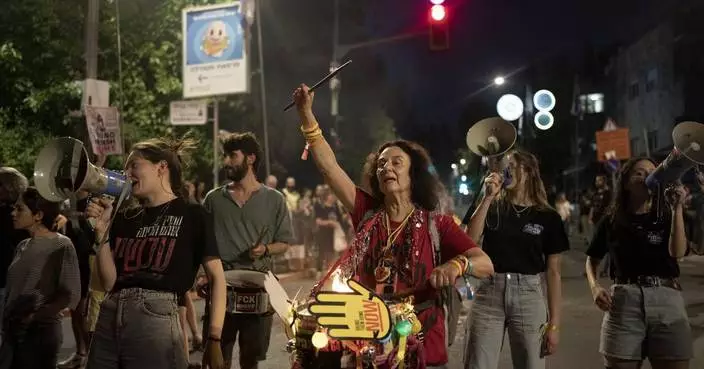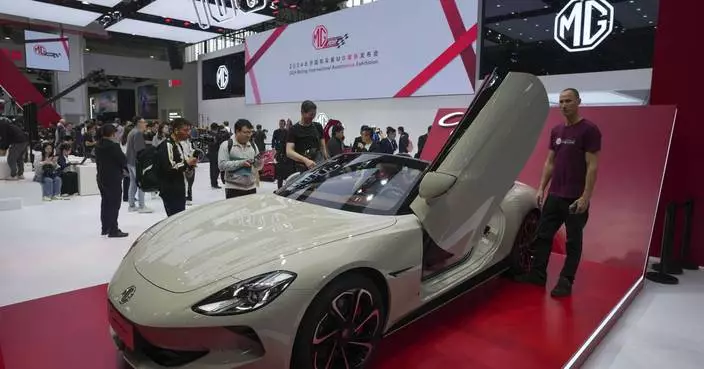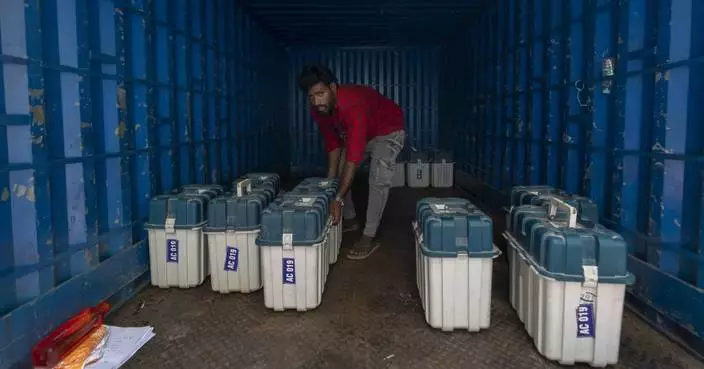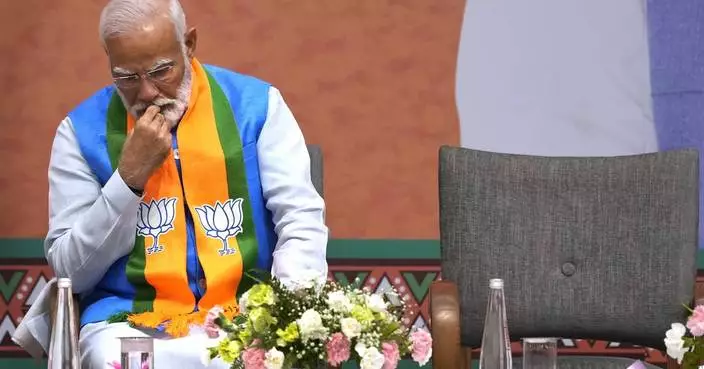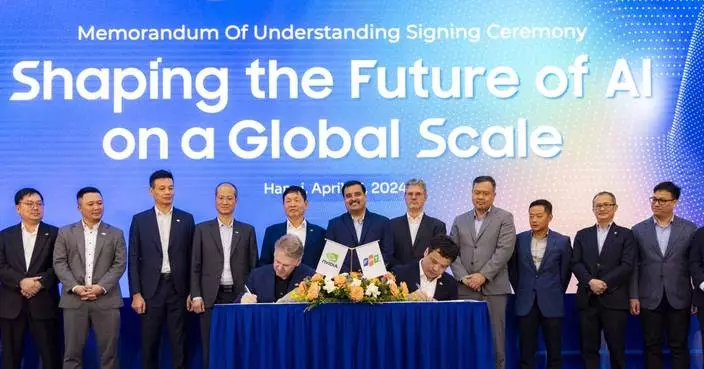The leaders of China and India stressed the importance of close ties in talks Saturday, against the background of their rivalry for leadership in Asia and the potential for cooperation on economic and security matters.
Solid China-India relations "are an important factor for global peace and stability," Chinese President Xi Jinping was quoted as telling Indian Prime Minister Narendra Modi at an informal summit in the central Chinese city of Wuhan on Saturday.
Click to Gallery
The leaders of China and India stressed the importance of close ties in talks Saturday, against the background of their rivalry for leadership in Asia and the potential for cooperation on economic and security matters.
The two Asian giants should "engage in even closer strategic communication," Xi was quoted by the official Xinhua News Agency as saying.
The meeting comes amid tensions over the contested China-India border and a rivalry for influence with smaller neighbors.
Following the most protracted standoff in years, India last year agreed to pull back troops from the disputed Doklam Plateau high in the Himalayas, where Chinese troops had begun constructing a road. China claims the strategically important region, but India says it belongs to ally Bhutan.
However, Modi's administration has been notably reluctant to engage with Beijing's "Belt and Road" initiative linking its economy to those of Asia, the Middle East, Africa and Europe through massive loans and investments.
Indian Prime Minister Narendra Modi gestures as he prepares to board his plane at the airport in Wuhan in central China's Hubei Province, Saturday, April 28, 2017. (Chinatopix via AP)
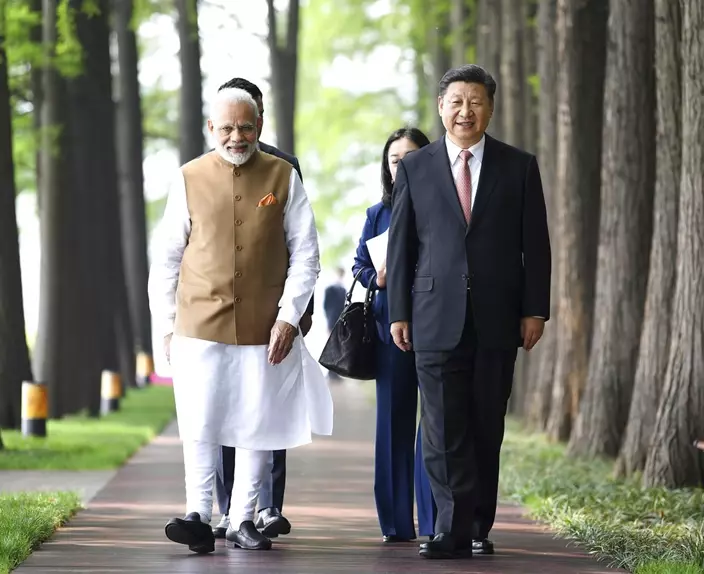
In this photo released by China's Xinhua News Agency, Indian Prime Minister Narendra Modi, left, and Chinese President Xi Jinping walk together in Wuhan in central China's Hubei Province, Saturday, April 28, 2018. (Yan Yan/Xinhua via AP)
The two Asian giants should "engage in even closer strategic communication," Xi was quoted by the official Xinhua News Agency as saying.
In a tweet, Modi said discussions over tea had been productive and that "Strong India-China friendship is beneficial for the people of our nations and the entire world."
Talks touched on economic issues, along with people-to-people relations, agriculture, technology, energy and tourism, Modi said in his tweet.
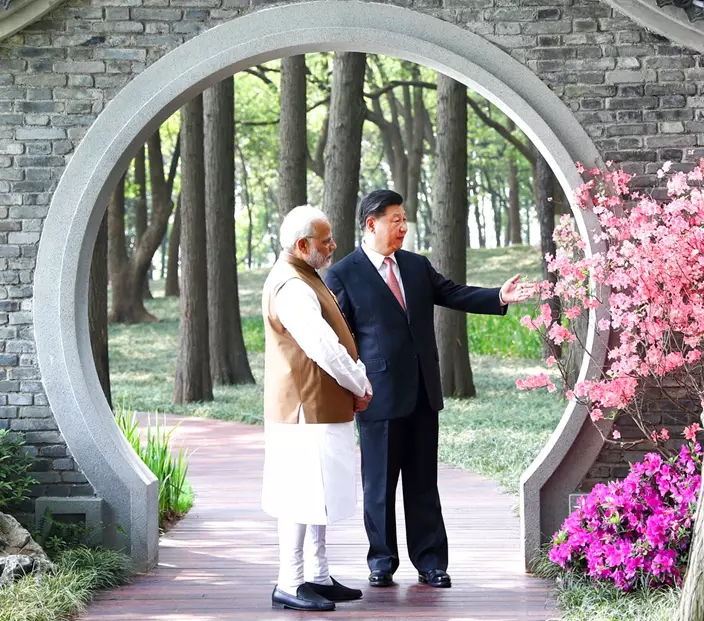
In this photo released by China's Xinhua News Agency, Indian Prime Minister Narendra Modi, left, and Chinese President Xi Jinping talk at a garden in Wuhan in central China's Hubei Province, Saturday, April 28, 2018. (Xie Huanchi/Xinhua via AP)
The meeting comes amid tensions over the contested China-India border and a rivalry for influence with smaller neighbors.
China-India relations date back centuries but in recent years have been characterized by competition for leadership in Asia.
The countries fought a border war in 1962 and last year engaged in a 10-week standoff. New Delhi has also been alarmed by China's moves to build ties with Indian Ocean nations including India's longtime rival Pakistan.
China, for its part, resents India's hosting of the exiled Tibetan spiritual leader the Dalai Lama, and its control of territory Beijing says belongs to it.
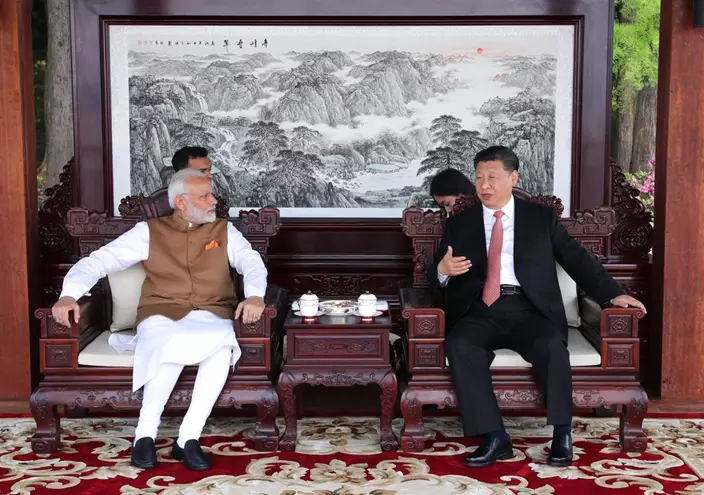
In this photo released by China's Xinhua News Agency, Indian Prime Minister Narendra Modi, left, and Chinese President Xi Jinping talk during a meeting in Wuhan in central China's Hubei Province, Saturday, April 28, 2018. (Pang Xinglei/Xinhua via AP)
Following the most protracted standoff in years, India last year agreed to pull back troops from the disputed Doklam Plateau high in the Himalayas, where Chinese troops had begun constructing a road. China claims the strategically important region, but India says it belongs to ally Bhutan.
Despite such differences, Modi hopes China can help drive Indian economic growth ahead of national elections next year. He also appears intent on building a strong personal relationship with Xi, who will be China's leader for years to come following the lifting of term limits on the presidency.
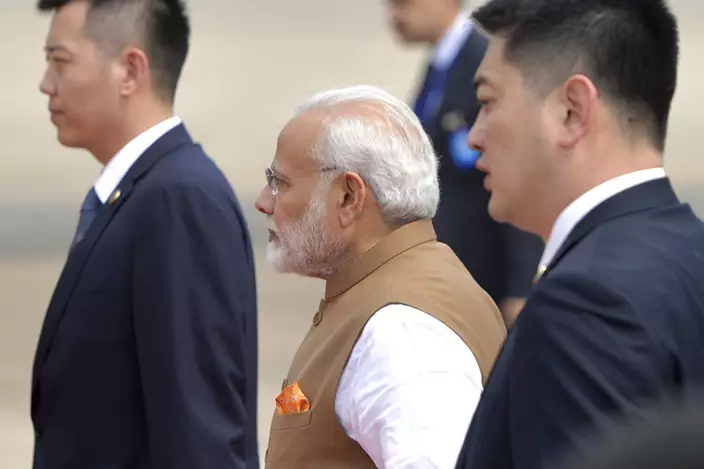
Indian Prime Minister Narendra Modi, center, prepares to board his plane at the airport in Wuhan in central China's Hubei Province, Saturday, April 28, 2017. The leaders of China and India stressed the importance of close ties in talks Saturday, against the background of their rivalry for leadership in Asia and the potential for cooperation on economic and security matters. (Chinatopix via AP)
However, Modi's administration has been notably reluctant to engage with Beijing's "Belt and Road" initiative linking its economy to those of Asia, the Middle East, Africa and Europe through massive loans and investments.
Modi will travel to China again in June for a summit of the eight-member Shanghai Cooperation Organization, which is dominated by Beijing and Moscow. Along with China, Russia and India, that group includes the Central Asian states of Kazakhstan, Kyrgyzstan, Tajikistan and Uzbekistan, as well as Pakistan.
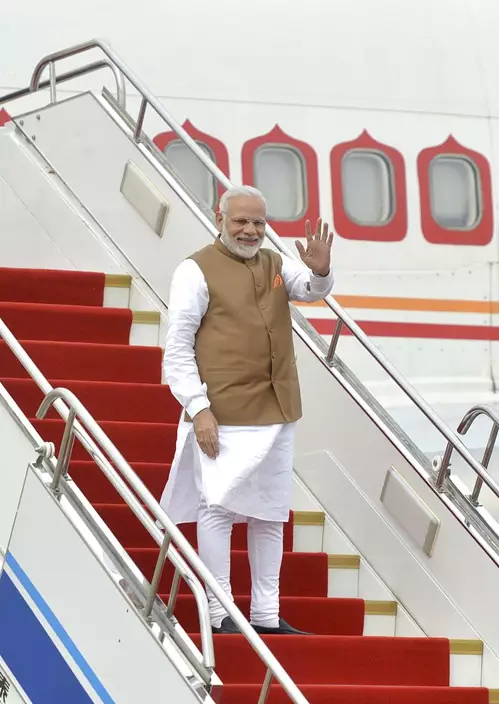
Indian Prime Minister Narendra Modi waves as he boards his plane at the airport in Wuhan in central China's Hubei Province, Saturday, April 28, 2017. (Chinatopix via AP)
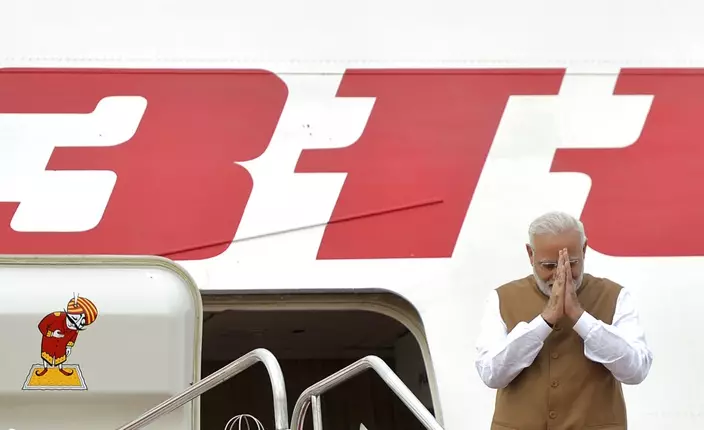
Indian Prime Minister Narendra Modi gestures as he prepares to board his plane at the airport in Wuhan in central China's Hubei Province, Saturday, April 28, 2017. (Chinatopix via AP)
SHANGHAI (AP) — U.S. Secretary of State Antony Blinken raised what the U.S. describes as unfair Chinese trade practices during his first full day of meetings in China on Thursday with local government officials in the financial hub of Shanghai.
Blinken met with the city's top official, Communist Party Secretary Chen Jining, and “raised concerns about (Chinese) trade policies and non-market economic practices," the State Department said in a statement.
It said he stressed that the United States seeks healthy economic competition with China and "a level playing field for U.S. workers and firms operating in China.”
“The two sides reaffirmed the importance of ties between the people of the United States and (China), including the expansion of exchanges between students, scholars, and business,” it said.
China's multibillion-dollar trade surplus with the U.S. along with accusations of intellectual property theft and other practices seen as discriminating against U.S. businesses in China have long been a source of friction in relations.
China, for its part, has objected strongly to U.S. accusations of human rights abuses and Washington's support for Taiwan, the self-governing island that Beijing considers its own territory and warns could be annexed by force.
Blinken also spoke with students and business leaders before flying to Beijing for what are expected to be contentious talks with national officials, including Foreign Minister Wang Yi and possibly President Xi Jinping.
Blinken arrived in Shanghai on Wednesday shortly before U.S. President Joe Biden signed a $95 billion foreign aid package that has several elements likely to anger Beijing, including $8 billion to counter China’s growing aggressiveness toward Taiwan and in the South China Sea. It also seeks to force TikTok’s China-based parent company to sell the social media platform.
China has railed against U.S. assistance to Taiwan and immediately condemned the aid as a dangerous provocation. It also strongly opposes efforts to force TikTok’s sale.
Still, the fact that Blinken made the trip — shortly after a conversation between Biden and Xi, a visit to China by Treasury Secretary Janet Yellen and a call between the U.S. and Chinese defense chiefs — is a sign the two sides are at least willing to discuss their differences.
“I think it’s important to underscore the value — in fact, the necessity — of direct engagement, of speaking to each other, laying out our differences, which are real, seeking to work through them,” Blinken told Chen.
“We have an obligation for our people, indeed an obligation to the world, to manage the relationship between our two countries responsibly,” he said. “That is the obligation we have, and one that we take very seriously.”
Chen agreed with that sentiment and said the recent Biden-Xi call had helped the “stable and healthy development of our two countries’ relationship.”
“Whether we choose cooperation or confrontation affects the well-being of both peoples, both countries, and the future of humanity,” he said.
Chen added that he hoped Blinken was able to get a “deep impression and understanding” of Shanghai, a city of skyscrapers, ports and more than 25 million people that is a magnet for commercially ambitious young people from China and abroad.
Most recently, the U.S. has raised concerns that potential overcapacity in Chinese industries — such as electric vehicles, steel and solar panels — might crowd out U.S. and other foreign manufacturers.
Shortly after arriving, Blinken attended a Chinese basketball playoff game between the local Shanghai Sharks and the Zhejiang Golden Bulls, with the home team losing in the last seconds in a 121-120 nailbiter.
With the U.S. presidential race heating up, it’s unclear what ramifications a victory for either Biden or former President Donald Trump might have for relations. But Trump could deepen a trade war he started during his first term. His tough rhetoric on China and isolationist approach to foreign policy could ramp up uncertainties.
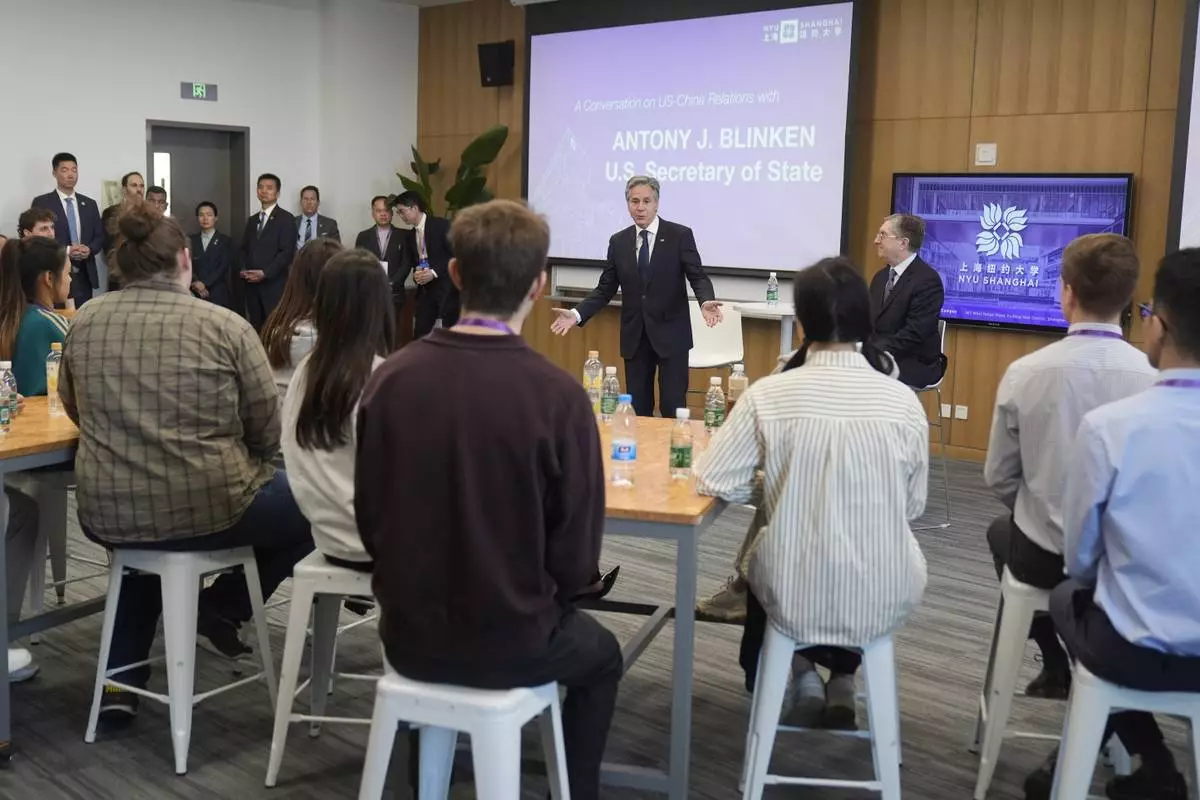
U.S. Secretary of State Antony Blinken, center, with NYU Shanghai Vice Chancellor Jeffrey Lehman, back right, talks to students at NYU Shanghai, Thursday, April 25, 2024, in Shanghai, China. (AP Photo/Mark Schiefelbein, Pool)
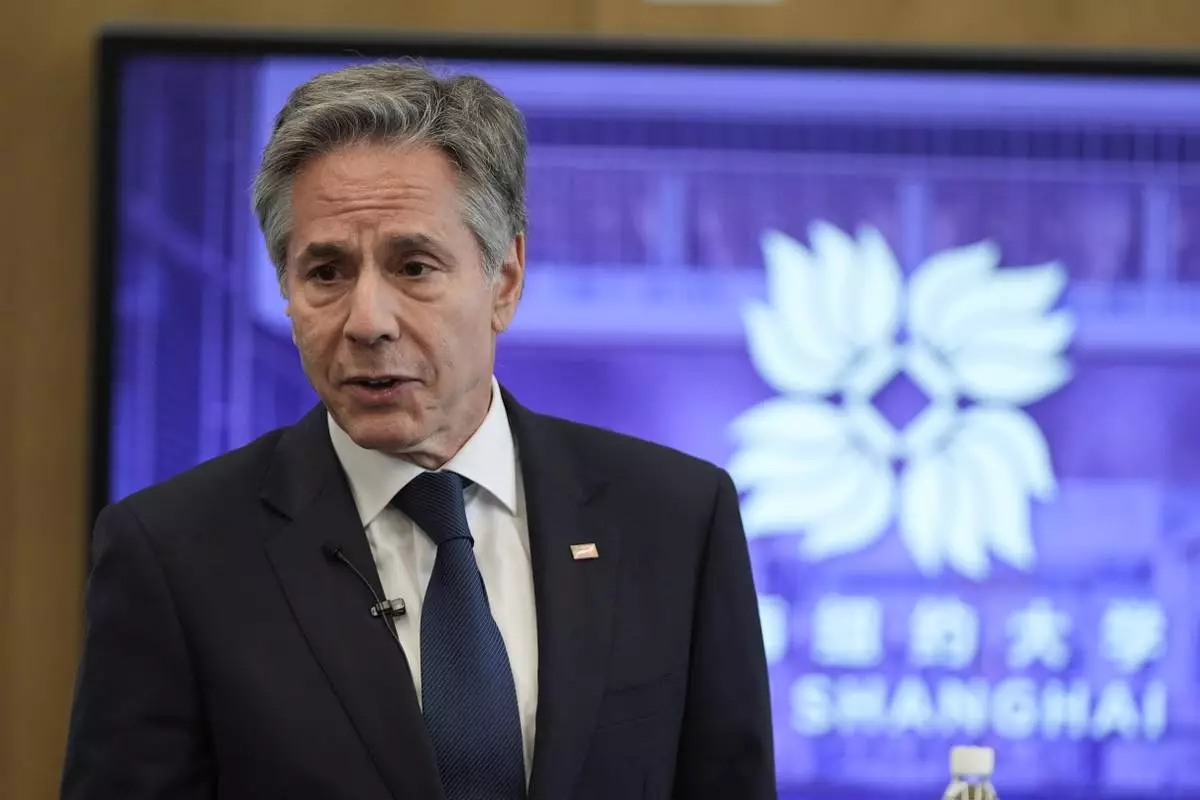
U.S. Secretary of State Antony Blinken talks to students at NYU Shanghai, Thursday, April 25, 2024, in Shanghai, China. (AP Photo/Mark Schiefelbein, Pool)
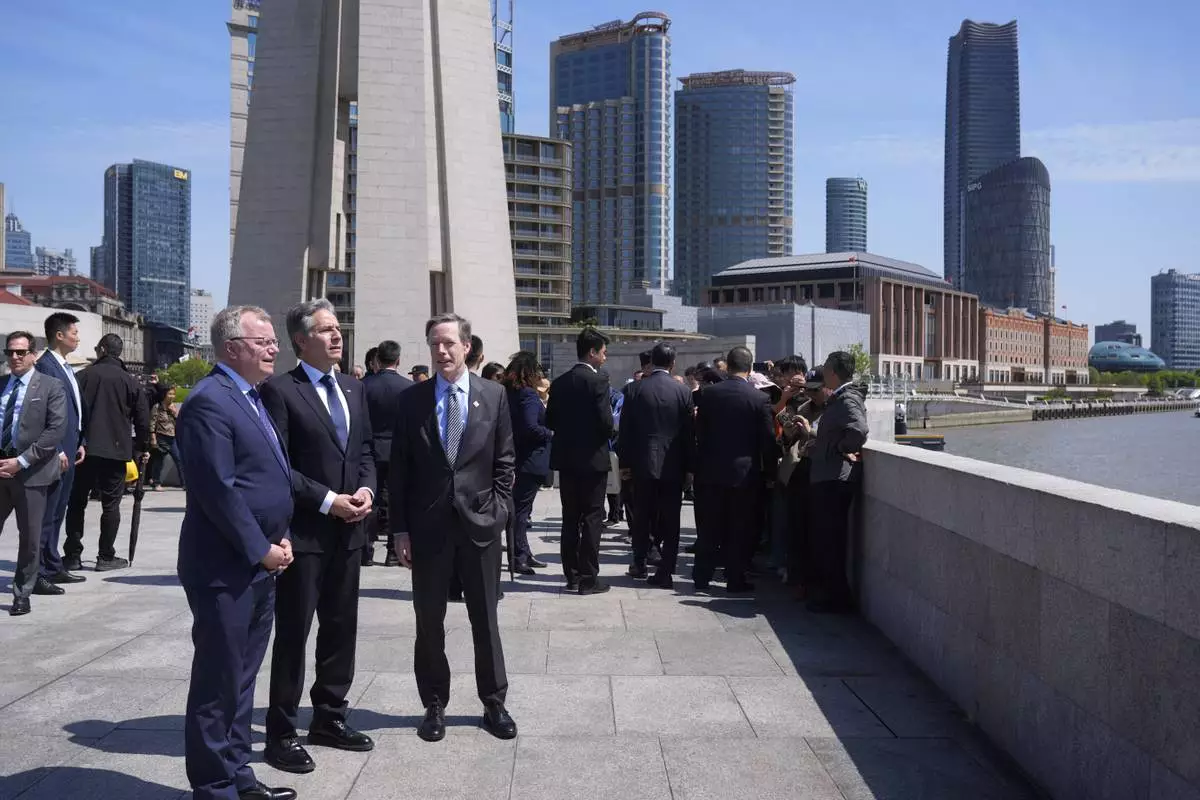
U.S. Secretary of State Antony Blinken, second left, U.S. Ambassador to China Nicholas Burns, third left, and Scott Walker, left, Consul General at the U.S Consulate General in Shanghai, visit a waterfront area called The Bund, Thursday, April 25, 2024, in Shanghai, China. (AP Photo/Mark Schiefelbein, Pool)
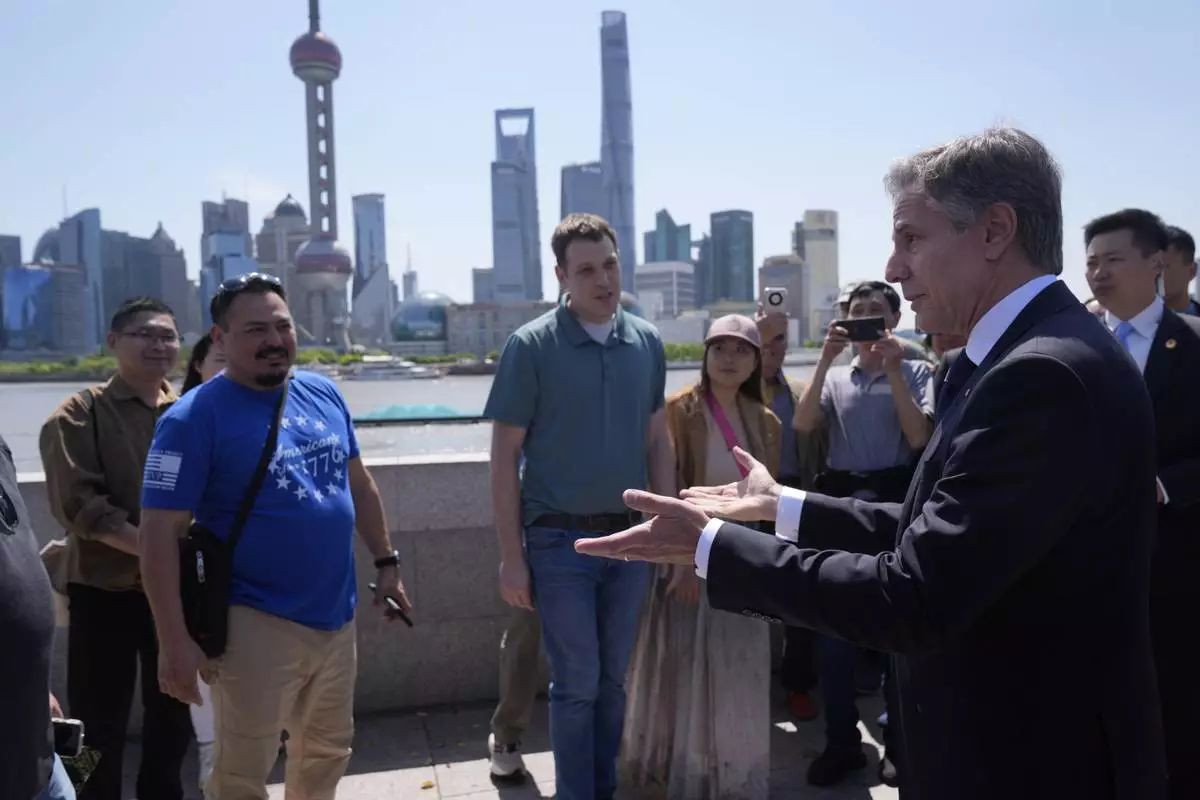
U.S. Secretary of State Antony Blinken, right, talks with U.S. tourists as he walks in a waterfront area called The Bund, Thursday, April 25, 2024, in Shanghai, China. (AP Photo/Mark Schiefelbein, Pool)
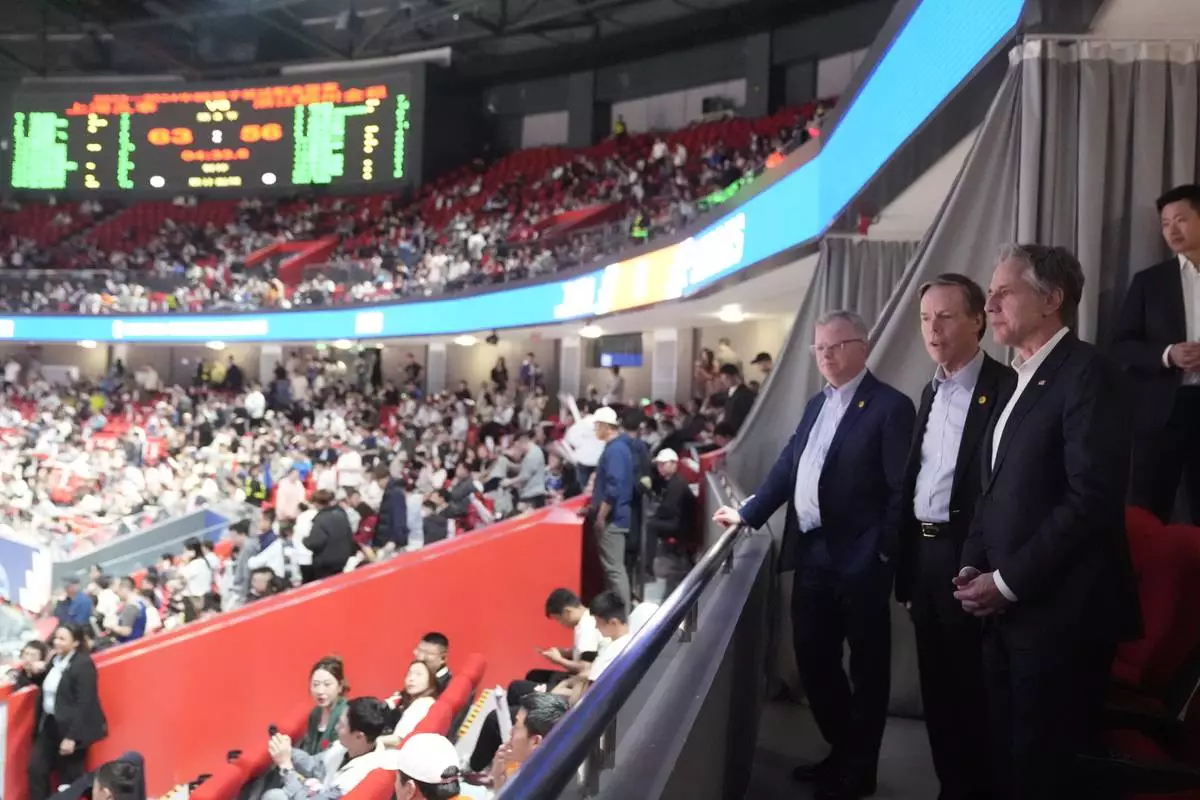
U.S. Secretary of State Antony Blinken talks with U.S. Ambassador to China Nicholas Burns, center, with U.S. Consulate General in Shanghai Scott Walker, left, while attending a basketball game between the Shanghai Sharks and the Zhejiang Golden Bulls at the Shanghai Indoor Stadium, Wednesday, April 24, 2024, in Shanghai, China. (AP Photo/Mark Schiefelbein, Pool)

U.S. Secretary of State Antony Blinken talks with U.S. Ambassador to China Nicholas Burns, center, with U.S. Consulate General in Shanghai Scott Walker, right, while attending a basketball game between the Shanghai Sharks and the Zhejiang Golden Bulls at the Shanghai Indoor Stadium, Wednesday, April 24, 2024, in Shanghai, China. (AP Photo/Mark Schiefelbein, Pool)
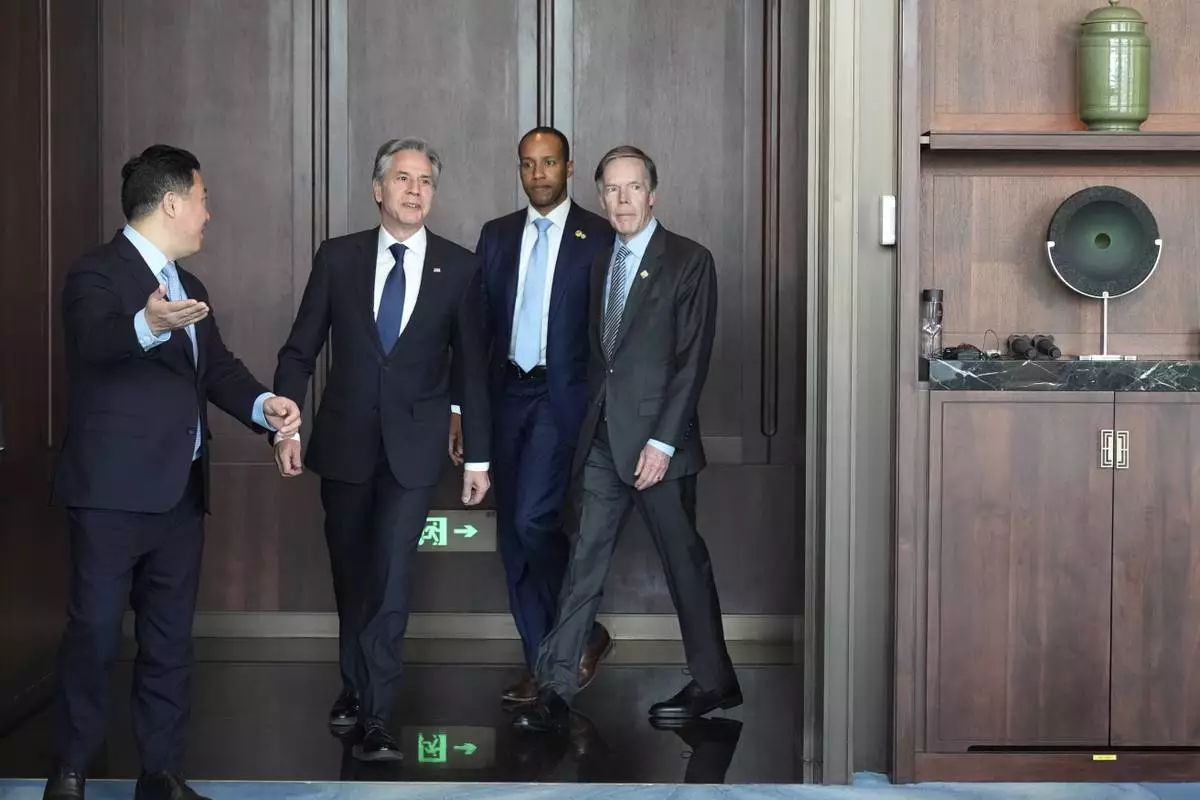
U.S. Secretary of State Antony Blinken, second left, and U.S. Ambassador to China Nicholas Burns, far right, arrive at the Grand Halls to meet with Shanghai Party Secretary Chen Jining on Thursday, April 25, 2024, in Shanghai, China. (AP Photo/Mark Schiefelbein, Pool)
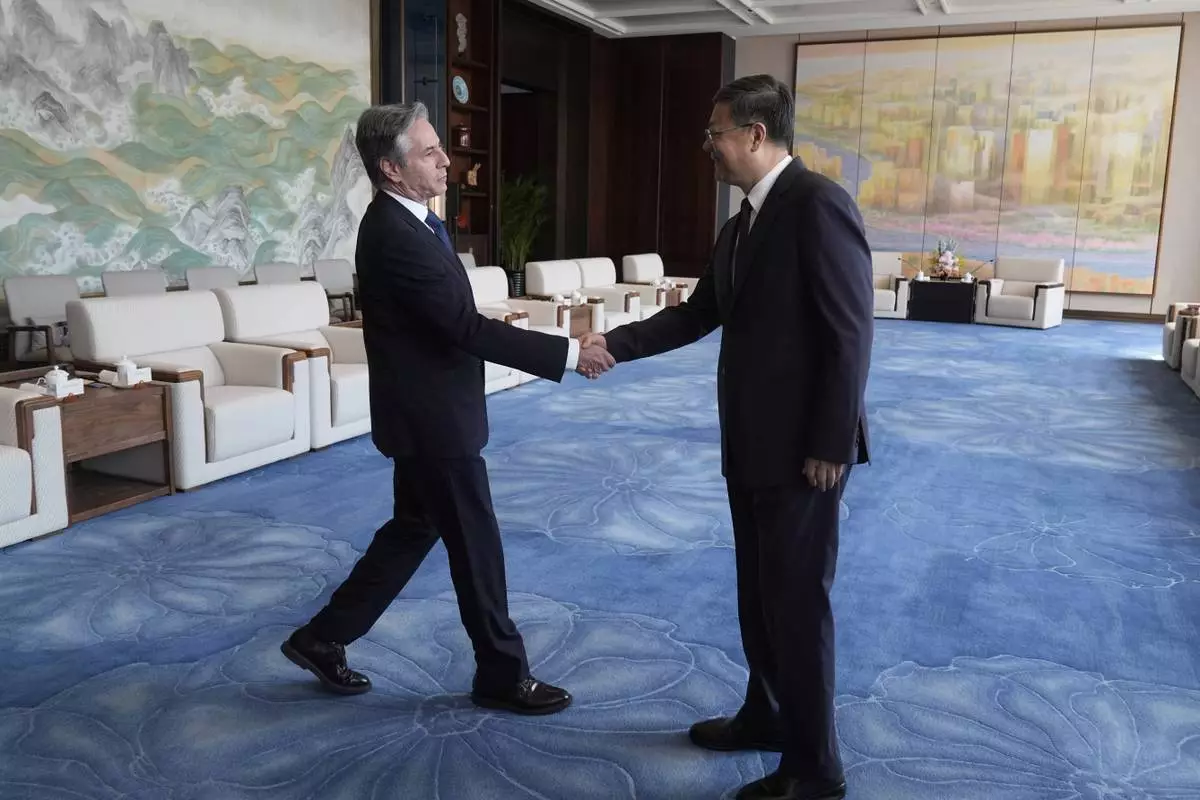
U.S. Secretary of State Antony Blinken, left, shakes hans with Shanghai Party Secretary Chen Jining as they meet at the Grand Halls, Thursday, April 25, 2024, in Shanghai, China. (AP Photo/Mark Schiefelbein, Pool)
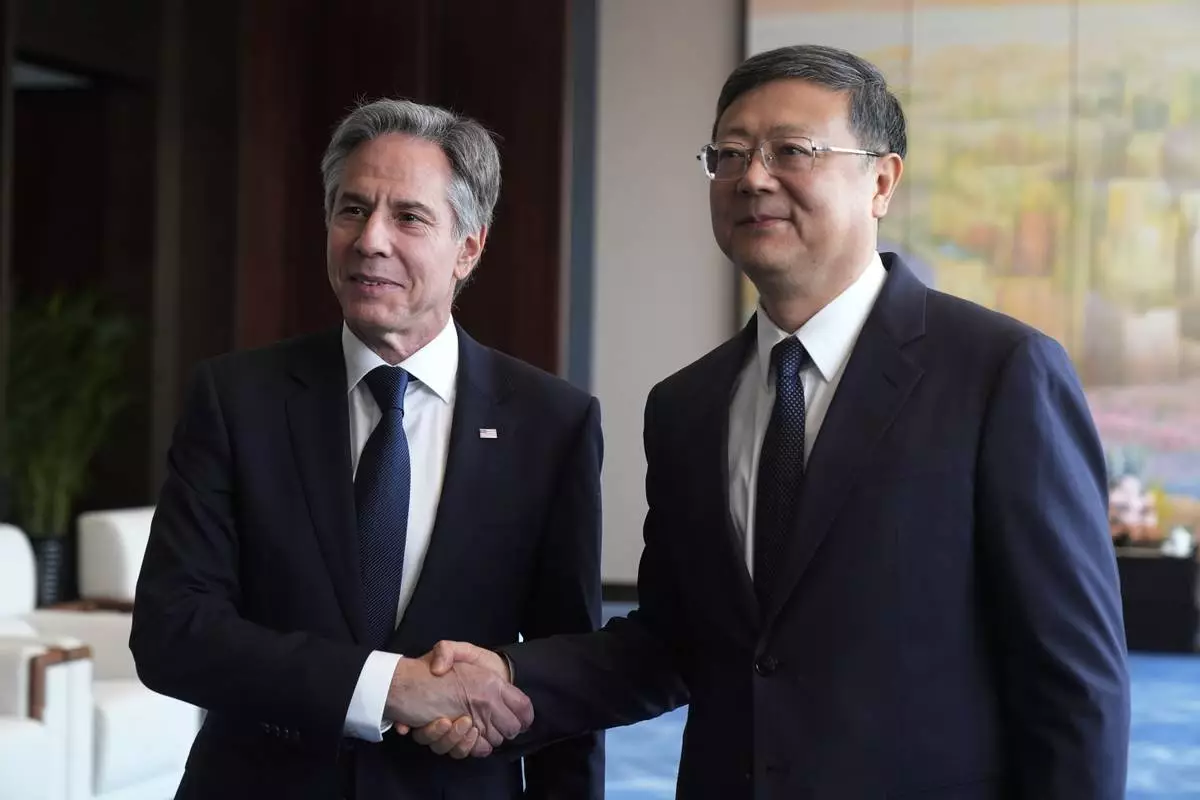
U.S. Secretary of State Antony Blinken, left, meets with Shanghai Party Secretary Chen Jining at the Grand Halls, Thursday, April 25, 2024, in Shanghai, China. (AP Photo/Mark Schiefelbein, Pool)
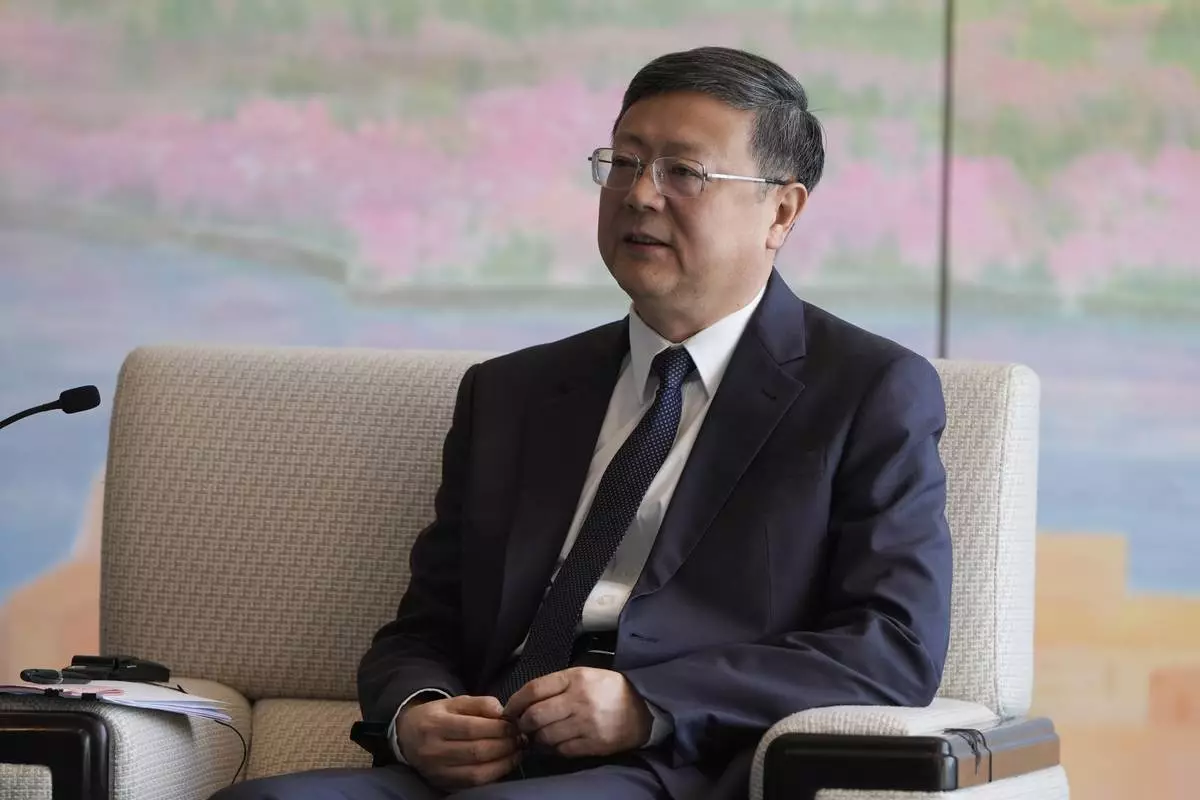
Shanghai Party Secretary Chen Jining talks with U.S. Secretary of State Antony Blinken at the Grand Halls, Thursday, April 25, 2024, in Shanghai, China. (AP Photo/Mark Schiefelbein, Pool)
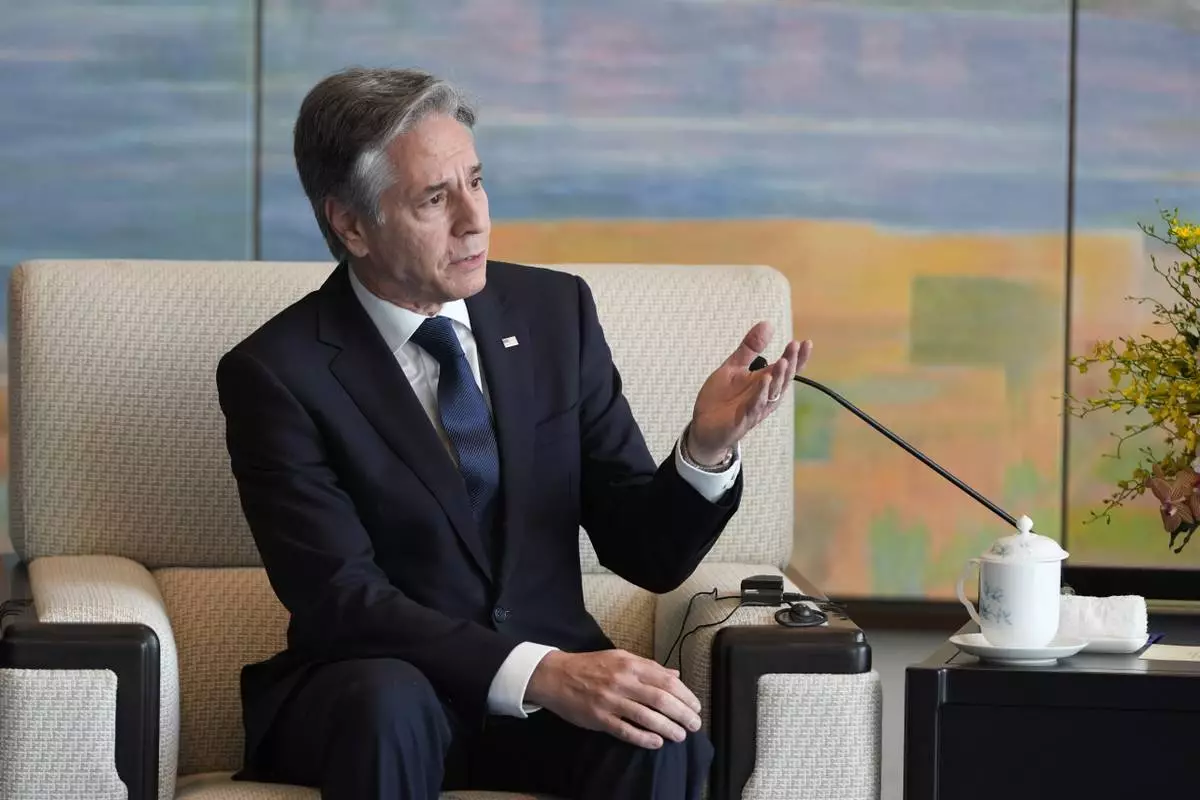
U.S. Secretary of State Antony Blinken talks with Shanghai Party Secretary Chen Jining at the Grand Halls, Thursday, April 25, 2024, in Shanghai, China. (AP Photo/Mark Schiefelbein, Pool)
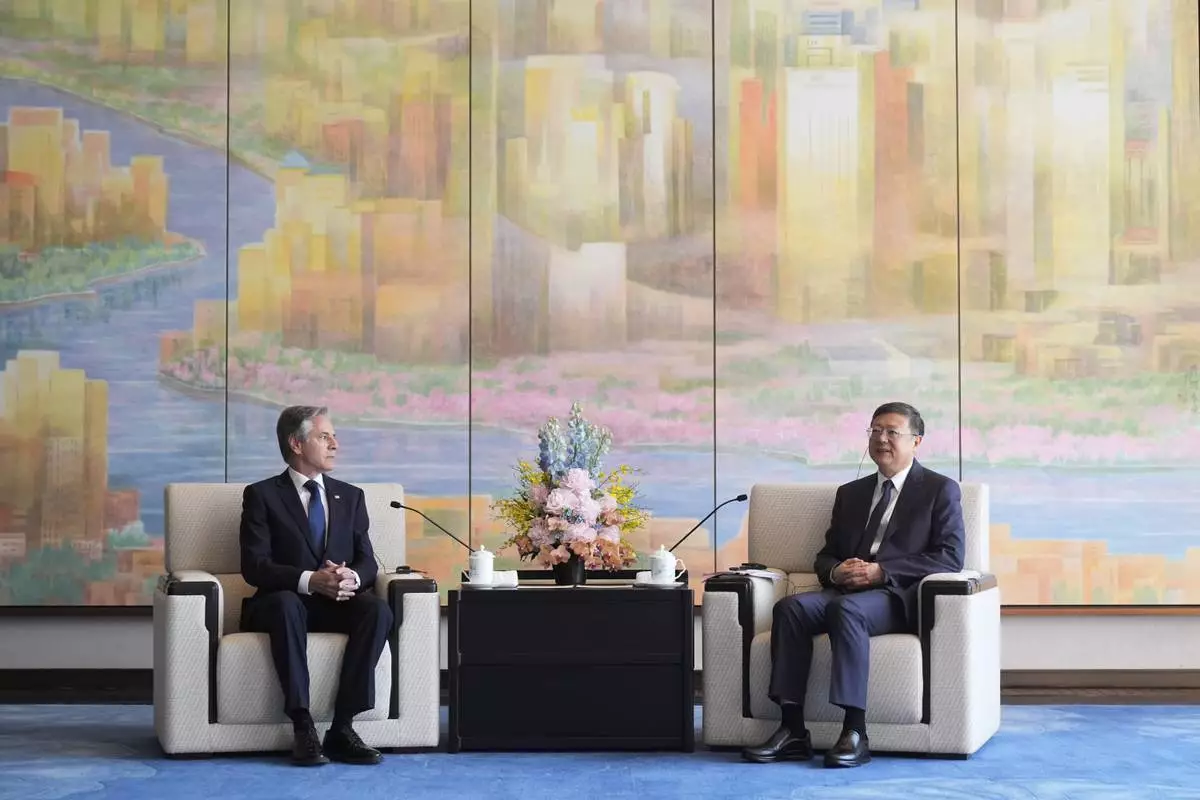
U.S. Secretary of State Antony Blinken, left, talks with Shanghai Party Secretary Chen Jining at the Grand Halls, Thursday, April 25, 2024, in Shanghai, China. (AP Photo/Mark Schiefelbein, Pool)
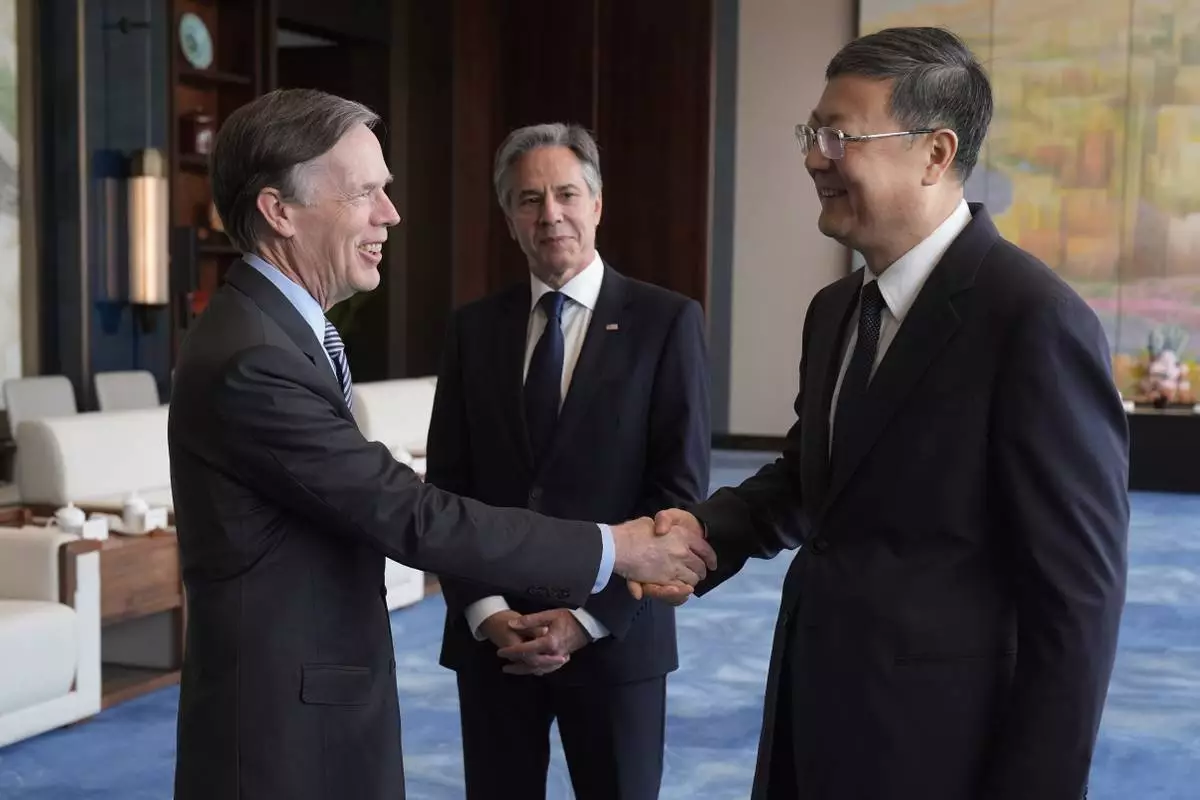
U.S. Secretary of State Antony Blinken, center, watches U.S. Ambassador to China Nicholas Burns, left, shake hands with Shanghai Party Secretary Chen Jining at the Grand Halls, Thursday, April 25, 2024, in Shanghai, China. (AP Photo/Mark Schiefelbein, Pool)






















